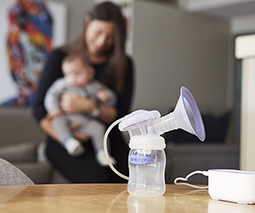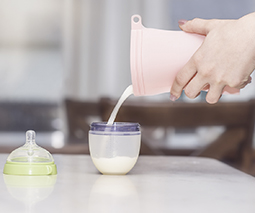Too much milk: Signs of breastmilk oversupply for you and your bub

During the first few weeks of breastfeeding, it’s normal for your breasts to make too much milk for your baby. This is a time when your supply is being established, and it takes a while for this to settle down.
However, if your breasts constantly feel full, this can lead to engorgement and blocked milk ducts, which can lead to mastitis. For most mums, oversupply usually settles down after a few weeks, for others, it can be an ongoing issue that affects both mum and baby.
Signs of breastmilk oversupply for you
Kate Hale, International Board Certified Lactation Consultant and director at Breastfeeding Help has come across many mums with an oversupply issue.
“Breastmilk oversupply is when Mum is actually making more milk than their baby needs,” says Kate. Some signs to look out for include breasts that constantly feel full, not needing to use the second breast at each feed, and blocked milk ducts.
Signs of milk oversupply in your baby
While the symptoms of oversupply in you are quite normal in early breastfeeding, the signs of oversupply in your baby are more noticeable – and problematic.
“Your baby may be fussy and unsettled, and doesn’t sleep very well for longer cycles,” says Kate.
You’ll also notice signs of milk oversupply in your baby’s poo. “Your baby may have frothy or green striped bowel movements and may often vomit after feeds. Baby may also be putting on a lot of weight very quickly. However, it’s not necessarily happy weight gain!”
Causes of breastmilk oversupply
Put simply, some women produce more milk than others. Other times, it can be down to excessive stimulation of the breasts, causing them to make more milk than your baby needs.
“It can be mums not looking at other reasons as to why the baby is grizzly and unsettled and using breastfeeding as the main way that they resettle. This then tells the breasts to keep making more,” says Kate. “Some mums will over stimulate their breasts by using the breast pump too much after feeds. That also tells the breasts to kick in and make more milk. Occasionally there are medical reasons that will cause oversupply. If your doctor is worried, a blood test needs to be done, and Mum may be referred to an endocrinologist.”
How oversupply affects breastfeeding
Although it’s wonderful to have an abundant supply of milk for your baby, oversupply can cause problems for you and bub. You’ll feel full and engorged a lot of the time and your breasts may leak, requiring multiple changes of breast pads.

“Mums often feed more frequently than necessary, because of feeling too full,” explains Kate. “Babies miss out on a lot of sleep, as they are awake with unsettled tummies often, which then leads to Mum feeling she needs to refeed sooner.”
As a result, you’ll probably find your baby unhappy and grizzly a lot of the time. On top of all this, because your breasts won’t have experienced being empty very often, you might find yourself with low supply at around six weeks, which can leave some mums weaning to formula earlier than planned.
Solving oversupply angst
Treatment for breastmilk oversupply means getting back to basics, advises Kate. “Learn from your breasts! Learn the feel of ‘very full’ and ‘not very full’ by feeling them before a feed and again when you feel they’re drained. Watch the way your baby swallows. Very quickly at the beginning, through to slow, little swallows towards the end.”
It’s also important to give your baby enough time to access the fattier milk at the end of the feed. You can help this process by ensuring the first breast is fully emptied before you offer the second breast.
Confidence is everything
As you gain more confidence in feeding, you’ll be able to hold off from offering the breast the minute your baby is unsettled. “This will help them be able to fit more of the whole first breast in, including the more high-fat milk from that breast,” advises Kate.
“Having all of the other breast is not as important, as this will be the ‘main course’ at the next feed. Gradually, your breasts are going to start to work out they don’t need to keep up such a high volume of milk, and your baby will have a much more manageable amount over the 24 hours. He will hopefully be more settled, sleep longer periods of time between feeds. Everyone should end up happier!”
Where does ‘block feeding’ come into it?
A common remedy for breastmilk oversupply is ‘block feeding’. However, Kate’s approach encourages mums to become more familiar with the way their breasts make milk.
“Block feeding is really just using the same breast for a number of hours each time the baby needs it. Then, of course, changing breasts for the next few hours. I’m suggesting similar, only to be more confident at the end of a feed that your baby is full and to hold off the next feed on the other breast at least 3 hours from start of feed to [the next] start of feed.”
If problems persist …
If you’re not having any luck, Kate suggests booking in a face-to-face consultation with someone that can help further.
“See your Health Professional if you’re worried, you have the start of mastitis coming on, or your baby is particularly unsettled,” Kate urges.
Remember, most breastfeeding problems are resolvable with the right support. However, it’s important to get help sooner rather than later to prevent any problems from getting worse.
 Need some more feeding advice? Our Parent School lactation experts can help. Click to find out more or book a one-on-one session.
Need some more feeding advice? Our Parent School lactation experts can help. Click to find out more or book a one-on-one session.













